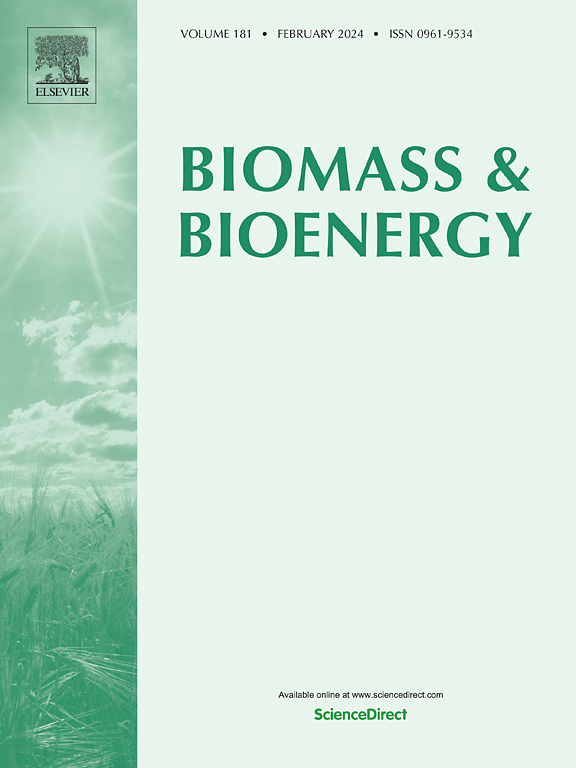生物废物利用和增值的可持续技术:前景和挑战
IF 5.8
2区 生物学
Q1 AGRICULTURAL ENGINEERING
引用次数: 0
摘要
在城市化和工业化的过程中产生了大量的生物垃圾,这是最重要的环境问题之一。因此,各种可持续技术被报道利用和增值所产生的生物废物。本文综述了利用零成本、生态友好、可生物降解、易获取的生物废弃物生产增值产品的最新进展。综述了热解、水热炭化、气化、厌氧消化、声光催化等先进技术在生物垃圾处理中的应用。但是,与生物废物相关的许多内在挑战,如污泥和副产品的可管理性、原料可变性、过程效率和价值增值技术在中试规模装置中的经济可行性。该领域的最新发展涉及使用创新、新颖和混合技术来减轻挑战,并通过将生物废物作为原料产生有价值的产品来最大化生物废物的价值。政策框架对于鼓励生物废物生物炼制工具用于生物经济并有助于发展生态友好型环境至关重要。在实践中,最佳的生物炼制方法依赖于技术、经济和环境可行性以及社会和政策的接受度。最后,本文综述了生物废物增值技术的最新发展、优势和局限性,以及对生物废物增值技术的批判性讨论和技术经济可行性,为生物经济的发展提供了新的视角。本文章由计算机程序翻译,如有差异,请以英文原文为准。

Sustainable technologies for bio-waste utilization and valorization: perspectives and challenges
A considerable amount of biowaste is generated through urbanization and industrialization, and it is one of the most important environmental problems. Thus, various sustainable technologies are reported that utilize and valorize the biowaste generated. The present review includes the recent developments in valorizing zero-cost, eco-friendly, biodegradable, and easily available biowaste to generate value-added products. Furthermore, the review also focuses on advanced techniques such as pyrolysis, hydrothermal carbonization, gasification, anaerobic digestion, and sonophotocatalysis processes for bio-waste valorization. But there are many intrinsic challenges associated with biowaste such as sludge and by-products manageability, feedstock variability, process efficiency and economic viability of the valorization techniques to the pilot scale-up setup. Recent developments in this field have involved the use of innovative, novel and hybrid techniques to mitigate the challenges and maximize the value of biowaste through employing it as a feedstock to generate valuable products. The policy frameworks are essential to encourage biowaste biorefinery implements for the bioeconomy and contribute to develop an eco-friendly environment. In practice, the best biorefinery approaches rely on technical, economic, and environmental viability as well as social and policy acceptance. Finally, this review covers the insight into the recent developments, advantage and limitations, along with critical discussion and techno-economic feasibility of the biowaste valorization techniques to give a new perspective for the bioeconomy's growth.
求助全文
通过发布文献求助,成功后即可免费获取论文全文。
去求助
来源期刊

Biomass & Bioenergy
工程技术-能源与燃料
CiteScore
11.50
自引率
3.30%
发文量
258
审稿时长
60 days
期刊介绍:
Biomass & Bioenergy is an international journal publishing original research papers and short communications, review articles and case studies on biological resources, chemical and biological processes, and biomass products for new renewable sources of energy and materials.
The scope of the journal extends to the environmental, management and economic aspects of biomass and bioenergy.
Key areas covered by the journal:
• Biomass: sources, energy crop production processes, genetic improvements, composition. Please note that research on these biomass subjects must be linked directly to bioenergy generation.
• Biological Residues: residues/rests from agricultural production, forestry and plantations (palm, sugar etc), processing industries, and municipal sources (MSW). Papers on the use of biomass residues through innovative processes/technological novelty and/or consideration of feedstock/system sustainability (or unsustainability) are welcomed. However waste treatment processes and pollution control or mitigation which are only tangentially related to bioenergy are not in the scope of the journal, as they are more suited to publications in the environmental arena. Papers that describe conventional waste streams (ie well described in existing literature) that do not empirically address ''new'' added value from the process are not suitable for submission to the journal.
• Bioenergy Processes: fermentations, thermochemical conversions, liquid and gaseous fuels, and petrochemical substitutes
• Bioenergy Utilization: direct combustion, gasification, electricity production, chemical processes, and by-product remediation
• Biomass and the Environment: carbon cycle, the net energy efficiency of bioenergy systems, assessment of sustainability, and biodiversity issues.
 求助内容:
求助内容: 应助结果提醒方式:
应助结果提醒方式:


